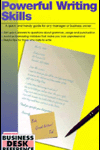Powerful Paragraphs and Sentences in Blogging for Business

“Construct your paragraphs with a good eye as well as a good mind,” advises Richard Anderson in Powerful Writing Skills. What does that mean? Consider how the paragraph looks on the page – would it be more appealing to the eye to divide it into two paragraphs?
Anderson’s reasoning includes the following considerations:
- Enormous blocks of print implant an image of difficulty in readers’ minds.
- Bunches of short paragraphs can be distracting.
The compromise: vary the length of your paragraphs without making the breaks seem forced. Generally speaking, Anderson points out, “the shorter the paragraphs and the fewer the number of ideas contained in them, the easier they are to read.
In writing good sentences, be yourself, using clear, honest, natural words on paper, Anderson tells writers. He recommends writers choose:
- nouns over adjectives
- verbs over adverbs
- plain verbs over fancy ones
- specific words over general ones
- short sentences over long ones
- personal over non-personal
But, if all your sentences are approximately the same length, Anderson warns, you’re putting your reader to sleep; vary the length as a subtle way to keep readers awake.
Another way to bore readers is using clichés (overused phrases). They numb readers’ senses, he warns, and they are often too general and vague. “Allow the meaning of your message to choose your words rather than the other way around,” Anderson suggests.
Strunk and White sum up the concept in their own book, The Elements of Style: For the same reason that a drawing should have no unnecessary lines and a machine no unnecessary parts, a sentence should contain no unnecessary words.

Leave a Reply
Want to join the discussion?Feel free to contribute!